Each February, you celebrate your appreciation for the people you love, but it is also a time to celebrate your passion for your work. Love Your Data Week, February 14–18, is a five-day, international event providing a unique opportunity to show your data some love as well! Let your data know you care by taking the time to organize your files, update your documentation and make a plan for publication and long-term preservation.
The ASU Research Data Repository, managed by ASU Library, helps you show that love. It is a publishing platform for sharing, downloading, archiving and exploring research data produced by ASU-affiliated research projects. We are ready to support your data sharing needs.
What to expect when working with us
Making research datasets accessible and reusable requires some effort to share because data are typically gathered and analyzed in a network of bespoke systems. So when you publish with us, you will work with library experts to make your data more discoverable and accessible to the research community. In addition to helping upload your files, we index your datasets and connect them to your articles, collaborators, funders and institutions.
Published datasets

Once published in the repository, your research datasets can be directly downloaded, referenced or analyzed via third-party applications. We register DOIs upon publication, and the repository generates suggested citations so users can confidently cite your datasets. You can make your files open to the public or restrict them as necessary. If you need to put some restrictions in place or set user agreements, you have the option to limit data access, establish custom terms of use, or set up a guestbook to approve or deny the requests. Regardless of the access restriction you selected, the metadata is fully open and discoverable so others can learn about your work.
Keep in mind that users still need to download the dataset files to use them, and if you have multiple or large files, downloading could take a significant amount of time. To manage user expectations for larger dataset files, we can work with you on developing recommendations that you can add to your dataset descriptions.
More than just a place to park your research data
Our research data publishing team follows the FAIR Principles to curate and preserve your research datasets so that others, particularly those not a part of your team, can find, understand, and use the datasets. We connect and properly give credit to those who initially gathered and analyzed the data.

The (CARE) principle for Indigenous Data Governance also guides us. CARE stands for Collective Benefit, Authority to Control, Responsibility, and Ethics. Our team facilitates indigenous data sovereignty giving agency and authority back to the community and enabling traditional knowledge. As data professionals, we need to develop active awareness of where we collect data, whom the data belongs to and the ethical implications the data may have for both researchers and the communities they serve and share this context with others.
When you submit your data, you will begin a working relationship with the ASU Library to expand the discovery and access of your datasets that facilitate the appropriate use and positive impact of your work.
Why is the repository called ASU Dataverse?

The repository is also known as ASU Dataverse because the open-source Dataverse software, developed by Harvard University, powers it. Additionally, a global community consortium supports the software that makes your research data available for reuse worldwide.
Dataverse utilizes your documentation to connect your datasets to their corresponding journal articles and other publications in ASU’s institutional repository, KEEP. Whether you publish your data with us or a domain repository, consider how you will make your research datasets visible, accessible and usable to others. During this Love Your Data Week, find the perfect gift for your research data.
Find the research data repository at dataverse.asu.edu
Check out ASU Research Data Management to see other data management resources and Love Your Data Week news.